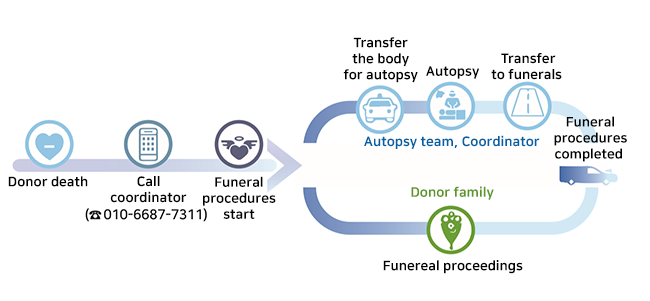
Ask Us Anything that You Want to Know about the Brain Donation

-
1. Why are brain donations needed?
 Post-mortem examinations of brain and spinal cord tissues are essential for an accurate diagnosis of incurable degenerative brain diseases such as Alzheimer’s disease, Parkinson’s disease, Lewy body dementia and Lou Gehrig’s disease
Post-mortem examinations of brain and spinal cord tissues are essential for an accurate diagnosis of incurable degenerative brain diseases such as Alzheimer’s disease, Parkinson’s disease, Lewy body dementia and Lou Gehrig’s disease
Clinical assessment (blood test, neuropsychological test, neuroimaging tests—MRI or PET scans, etc.) itself cannot be enough to make a diagnosis of degenerative brain diseases, such as Alzheimer’s disease, Parkinson’s disease, Lewy body dementia, and Lou Gehrig’s disease. An accurate diagnosis of such diseases can only be made by confirming the presence of the protein that caused the disorder during post-mortem examinations of the brain and spinal cord tissues.
 Research on brain and spinal cord tissues are required for the development of new cures for incurable degenerative brain diseases.
Research on brain and spinal cord tissues are required for the development of new cures for incurable degenerative brain diseases.
Degenerative brain diseases, such as Alzheimer’s disease, Parkinson’s disease, and Lou Gehrig’s disease are currently classified as incurable and intractable diseases. We do not know why some people suffer from Alzheimer’s disease or dementia, whereas others live healthy lives in their old age. Furthermore, there is no cure to get rid of the proteins that cause degenerative brain diseases. Research on brain and spinal cord tissues would be of great help in identifying the real causes of degenerative brain diseases and developing new cures.
Therefore, by donating brain and spinal cord tissues one can contribute to understanding the causes of degenerative brain diseases and the development of a cure for such diseases. In addition, an accurate diagnosis of dementia can be made, and thereby knowledge and information about the disease that your family member is suffering from can be obtained. -
2. Can people without degenerative brain diseases donate their brains?
Of course, they can.
Changes due to the normal aging process and degenerative brain diseases can be distinguished and relevant research can be conducted only by comparing the brain tissues of patients with degenerative brain diseases, such as Alzheimer’s disease, and those of people without. -
3. How do I register for a brain donation?
You have to complete the required forms on your own in order to register for a brain donation.
When the patient cannot decide by him/herself due to a cognitive impairment, not only the consent of the patient but also the consent of the legal representative is required. The legal representative who signs the relevant form shall also submit documents (certificate of family relations, etc.) that can prove that he/she is the legal representative of the patient. Please contact the special coordinator of the PNUH Brain Bank (+82-10-6687-7311) for complete details of the process for brain donation and ways to donate your brain.

-
4. Will it cost us to donate brains?
No. Family members of the deceased and the registered brain donor do not have to pay for anything related to the brain donation.
-
5. What should we do on the death of a registered brain donor?
The brain of the deceased brain donor should be donated within 24 hours following their death.
Therefore, family members of the registered brain donor should contact the coordinator of the Brain Bank (+82-10-6687-7311) immediately after the registered brain donor’s death. The special coordinator can then adjust the schedule for the brain donation based on the funeral arrangements.

-
6. Does brain donation interfere with funeral arrangements?
It will take approximately 4 to 8 hours to move the body of the brain donor from the funeral home to the Pusan National University’s School of Medicine in Yangsan-si, Gyeongsangnam-do and to bring the body of the brain donor back to the funeral home.
All these procedures shall be arranged by the medical team and special coordinator. Therefore, family members of the deceased have nothing to worry about regarding this matter. -
7. Why does the spinal cord also need to be donated when you donate the brain?
The spinal cord is an important body part that allows us to move the body by delivering messages from the brain down to the peripheral nerves. Also, it transmits the stimulus received from the parts at the end of the body to the brain. Especially, in the event of degenerative changes in the spinal cord, a degenerative brain disease, namely Lou Gehrig’s disease, can develop. Additionally, various degenerative brain diseases including frontotemporal dementia can also develop along with Lou Gehrig’s disease.
Therefore, examinations of the spinal cord tissues are also required along with those of brain tissues in order to conduct research to find out the causes and diagnose degenerative brain diseases.






